Foreign Policy Populism: The Final Frontier
The tectonic shifts occurring simultaneously in both geopolitics and domestic politics open the possibilities for a powerful, crosscutting new platform for rising political leaders.
This unlikely alliance between the Left and the Right is perhaps the most enticing reason for politicians to take notice. This is reflected in the J. Wallin Opinion Research survey, which revealed preferences for restraining military action overseas crossed boundaries of political party, race, ideology, gender and geography. Researchers acknowledged that rarely do issues enjoy such bipartisan consensus. This corroborates with the findings of Douglas Kriner of Boston University, which show that attitudes against military intervention were running high amongst those communities that lost soldiers. Survey Sampling International revealed similar findings, that a greater share of military veterans, 61 percent, are weary of foreign intervention than the general public. These communities aversion to Clinton’s hawkishness are said to have contributed to Trump’s victory. Now the divide is not between people of varying political stripes, but between the public and mainstream politicians.
Trump’s interventionism after taking office has betrayed the expectations of much of his base and contradicted public opinion, which given Trump’s general unpopularity, provides further opportunities for rising political leaders. The aforementioned defense spending increase comes amidst Sample Survey International polling that reveals 79 percent of Americans want any extra funding to be spent on domestic issues. Defense Secretary Mattis’ recent decree that countering great powers like China and Russia, and not terrorism, is now central to U.S. defense strategy flies in the face of polling numbers that show more Americans consider China a competitor than an enemy. Additionally, more than half of the people who participated in the poll saw Russia as a potential partner for the United States. Announcement of an enduring U.S. presence in Syria disregards 51 percent of Americans who opposed deploying ground troops there at all.
In Britain, the mainstream media and politicians attacked Jeremy Corbyn for defying the rules of political correctness following a terror attack. He dared to acknowledge that some of its cause lay in foreign policy—in contrast to the Conservative government’s response, and in line with what many analysts had long said. Corbyn’s view, however, turned out to also be in line with the British public. YouGov found that 53 percent of those polled supported his contention versus less than half of that sum, 24 percent, who believed foreign policy played no role. Similar to polls conducted in the United States, the YouGov poll revealed opposition to British intervention overseas.
For the last few decades it would seem that the few who profited from war were permitted to influence foreign policy. The West’s—particularly America’s—overwhelming military superiority ensured that for many years, unlike in World War II or even unlike in Vietnam, Western publics did not realize the full costs of war. Now, with terrorism commonplace and the war casualties mounting, the population’s preferences are turning into electoral demands. The mainstream media, and its denial of a broad range of opinions into discussions over foreign policy, is increasingly distrusted. Politicians seeking to win broad-based support may well wish to argue that one of the most important policy areas within democratic societies should be made democratic.
Kadira Pethiyagoda is a nonresident fellow in Asia-Middle East Relations at the Brookings Doha Centre.
Image: Reuters
Recommended:
Why North Korea's Air Force is Total Junk

